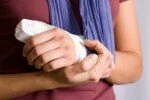 |
Find Your Medication |


New osteoporosis treatment successful in mice, study says
After initiating menopause in laboratory mice scientists in New York were able to increase the rate of bone regeneration in these animals.
After initiating menopause in laboratory mice by removing their ovaries, scientists in New York were able to increase the rate of bone regeneration in these animals by injecting them with a polyclonal antibody. The researchers hope this treatment will prove to be a safe way for women to combat bone weakness associated with osteoporosis. Individuals suffering from this condition can also buy Actonel from Canadian and international online pharmacies to treat their symptoms. These findings have been published in the journal Proceedings of the National Academy of Sciences. "Bone loss in women begins very early, at least two to three years before a woman's last period, and within eight to ten years, a woman will lose 50 percent of her lifetime bone loss. It occurs painlessly, without notice up to a point where women fracture," said said senior investigator Mone Zaidi, professor of medicine and structural and chemical biology at Mount Sinai School of Medicine. Zaidi said the goal of these experiments is to find a means of averting osteoporosis completely, as opposed to treating it with medication and physical therapy. "We believe that a future humanized monoclonal antibody to the follicle-stimulating hormone is likely to be safer than existing treatments because it will not reside in the bone," she said. According to the National Osteoporosis Foundation, the condition is a threat for approximately 44 million Americans, and 55 percent of all persons over the age of 50. Although only 10 million people are documented as having osteoporosis, eight million of those are women. The organization also suspects that the bone-deteriorating condition has been under-diagnosed in Caucasian and African-American women. Even though osteoporosis is normally associated with aging, cases of individuals from every age group developing it have been reported. |
See also ...
- New study suggests Tamoxifen treatment should be extended to 10 years
- Aspirin could slow age-related cognitive decline in women
- Antidepressant may also reduce menopausal symptoms
- Depression causes widespread work absences, studies find
- Paxil may help prevent heart failure
- Melatonin and exercise shown to reduce Alzheimer's symptoms in mice
- New schizophrenia treatment canceled due to poor results
- Yale uses biochemistry in an attempt to combat depression
- Scientists say creating an anti-heart disease vaccine could be possible
- Research shows progress toward creating Alzheimer's blood test
- New drug cocktail cures coke addiction in lab rats
- Algae extract may improve cholesterol levels
- There are as many undiscovered drugs as stars in the sky, researchers say
- Researchers develop new test for osteoporosis
- Statin medications may reduce the size of men's prostates
- Researchers find process that leads to development of arthritic condition
- Researchers find new treatment that may quell joint swelling
- Researchers develop new treatment for enlarged prostate
- New study shows antidepressants can alleviate arthritis pain
- Study uses stem cells to treat osteoporosis
- Statins equally as effective in women as men
- Blood sugar monitoring shows little benefit
- Use of cane reduces arthritic knee pain
- Researchers explain how statins may fight breast cancer
- Study pinpoints genetic sign of osteoarthritis
- Researcher talks arthritis cure
- Broad approach of new drug may prevent progression of Alzheimer's
- New osteoporosis medication fails in clinical trial
- Second biopsy may determine efficacy of breast cancer treatments
- New study confirms benefits of Lipitor
- Researchers find why some women are resistant to Tamoxifen
- Researchers work toward new drug to treat BPH
- Researchers discover source of inflammation that leads to arthritis
- Aggressive blood sugar control may provide no benefit for diabetics
- Researchers uncover process that potentially causes arthritis
- Bipolar disorder and schizophrenia share many brain similarities
- Researchers make important finding in drug-resistant breast cancer
- Study findings medication improve BPH symptoms
- Treating acid reflux is possible
- Researchers say treatment for acid reflux is effective
- South Asians are more likely to develop obesity-related health conditions like diabetes, study finds
- Aggressively lowering blood sugar may have few benefits for diabetics
- Stem cell therapy may be the future of osteoporosis treatment
- Controlling acid reflux shown to benefit patients with lung condition
- Traditional remedies show little improvement for arthritis
| IMPORTANT DISCLOSURE: All medical content and news articles on this website is supplied by an independent third party company. While the information can be useful, this website relies on others for its creation and cannot guarantee the accuracy, medical efficacy, or reliability of the information provided. In all circumstances, you should always seek the advice of your physician and/or other qualified health professional(s) for drug, medical condition, or treatment advice. This website does not provide any medical advice. The content provided on this website is not a substitute for professional medical advice, diagnosis or treatment. |
- Terms & Conditions
- |
- Privacy Policy
- |
- Shipping Policy
- |
- My Account
- |
- Refill Prescription
- |
- Product Search
- |
- How to Order
- |
- Customer Service
- |
- About Us








